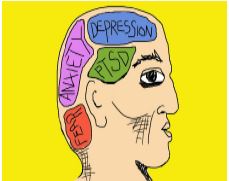May is Mental Health Awareness Month, a time dedicated to shedding light on the significance of mental health and advocating for increased understanding, support, and resources. While mental health is a critical aspect of overall well-being for everyone, its importance within the criminal justice system cannot be overstated. This blog post aims to explore the vital connection between mental health awareness and the criminal justice system, highlighting the challenges faced by individuals with mental health conditions and the necessity of reforming existing practices.

The Prevalence of Mental Health Issues: It is estimated that a significant portion of the incarcerated population around the world struggles with mental health issues. Many individuals who come into contact with the criminal justice system have underlying mental health conditions that often go undiagnosed or untreated. Substance abuse disorders, depression, anxiety, bipolar disorder, and post-traumatic stress disorder (PTSD) are among the most common mental health challenges faced by individuals in the criminal justice system.
Impact on Offending Behavior: Untreated mental health conditions can have a profound impact on a person’s behavior, leading to increased risk of involvement in criminal activities. Mental health issues can contribute to impaired judgment, emotional instability, and difficulty managing impulses. These factors can exacerbate criminal behavior, perpetuating a cycle of interaction with the criminal justice system.
Lack of Adequate Mental Health Services: A significant challenge within the criminal justice system is the lack of access to appropriate mental health services. Many individuals with mental health conditions end up incarcerated instead of receiving the necessary treatment and support they require. Limited resources, understaffed correctional facilities, and inadequate training for law enforcement personnel further compound the problem, often resulting in inadequate care and inappropriate responses to mental health crises.
Criminalization of Mental Illness: The criminal justice system has, to some extent, become a default provider of mental health services, unintentionally contributing to the criminalization of mental illness. Due to a lack of community-based mental health resources, individuals in crisis often end up in emergency rooms or jails instead of receiving proper mental health care. This approach fails both the individuals and the system as a whole, perpetuating a cycle of incarceration and neglect.
The Need for Reform and Support: To address these challenges, there is an urgent need for criminal justice reform that prioritizes mental health awareness and support. This reform should include increased training for law enforcement on recognizing and appropriately responding to mental health crises, diversion programs that provide alternatives to incarceration, and improved collaboration between mental health professionals and the criminal justice system. Additionally, investing in community-based mental health services and early intervention programs can help prevent individuals from entering the criminal justice system in the first place.

Mental Health Awareness Month provides an opportunity to raise awareness about the critical connections between mental health and the criminal justice system. By recognizing the prevalence of mental health issues, understanding their impact on criminal behavior, and advocating for reform, we can work towards a more compassionate and effective approach. Promoting mental health awareness within the criminal justice system is not only crucial for individuals with mental health conditions but also for the overall well-being of communities and the pursuit of justice. Together, we can strive for a system that prioritizes treatment, support, and rehabilitation, ultimately fostering a society that values the mental health of all its members.
